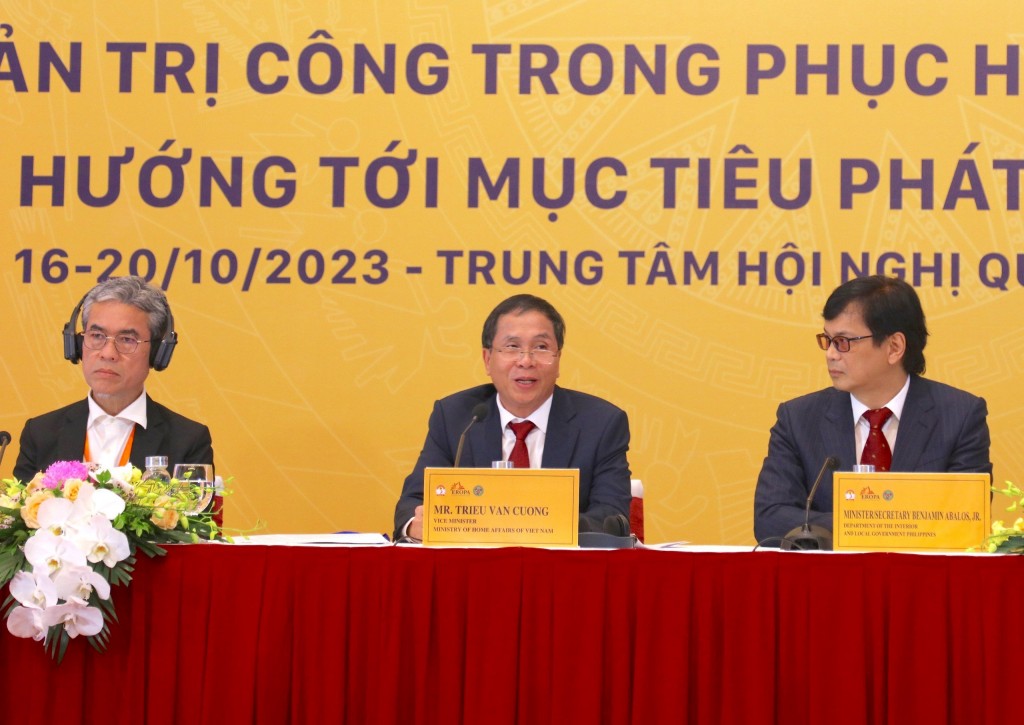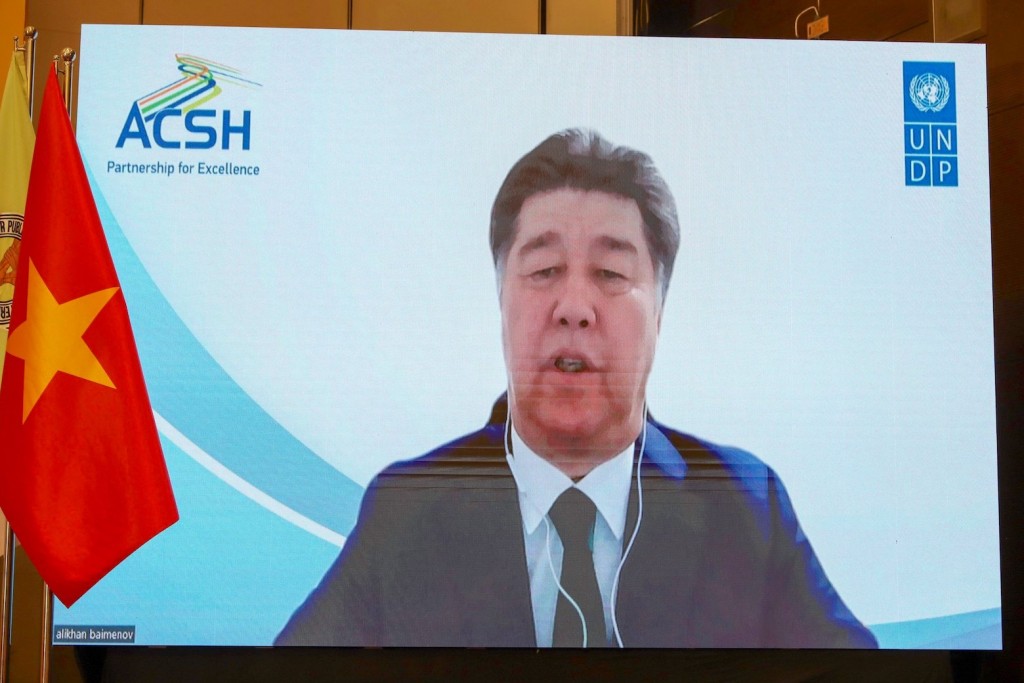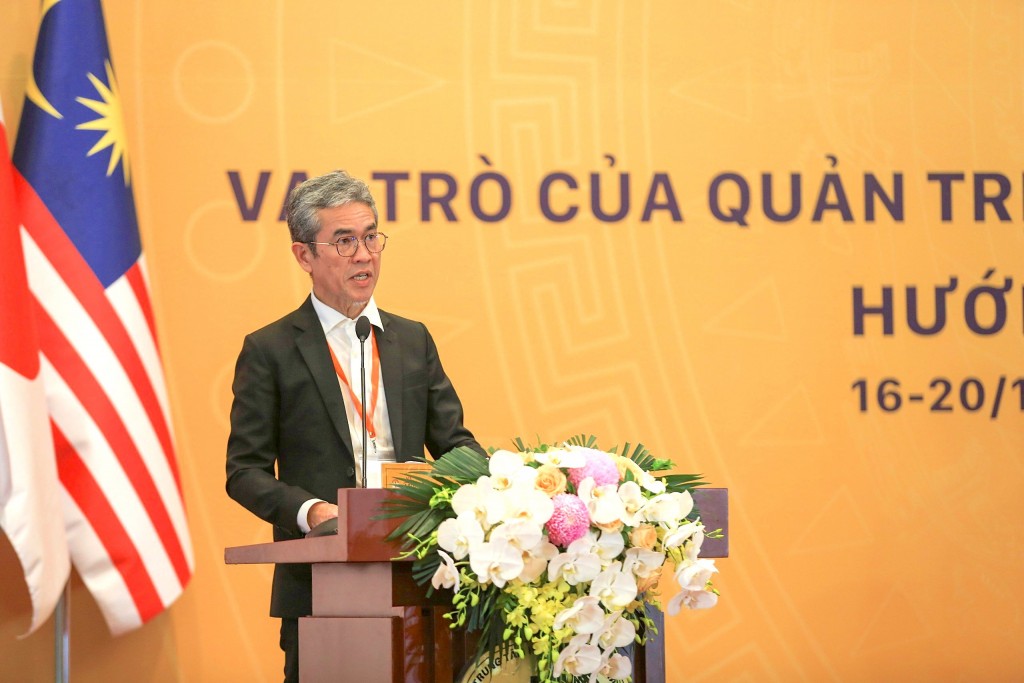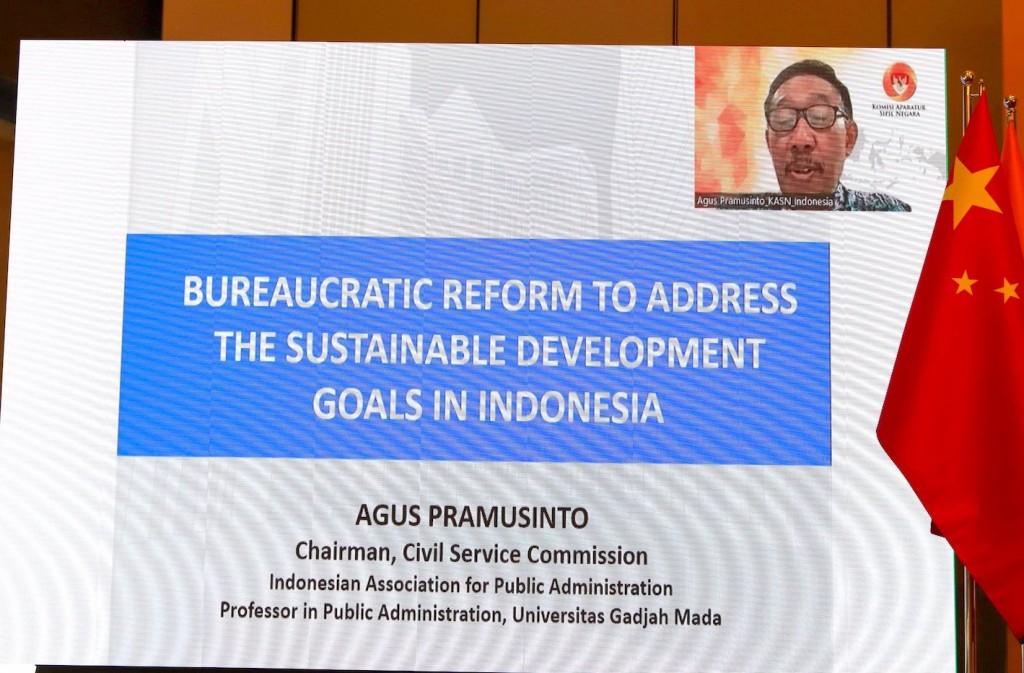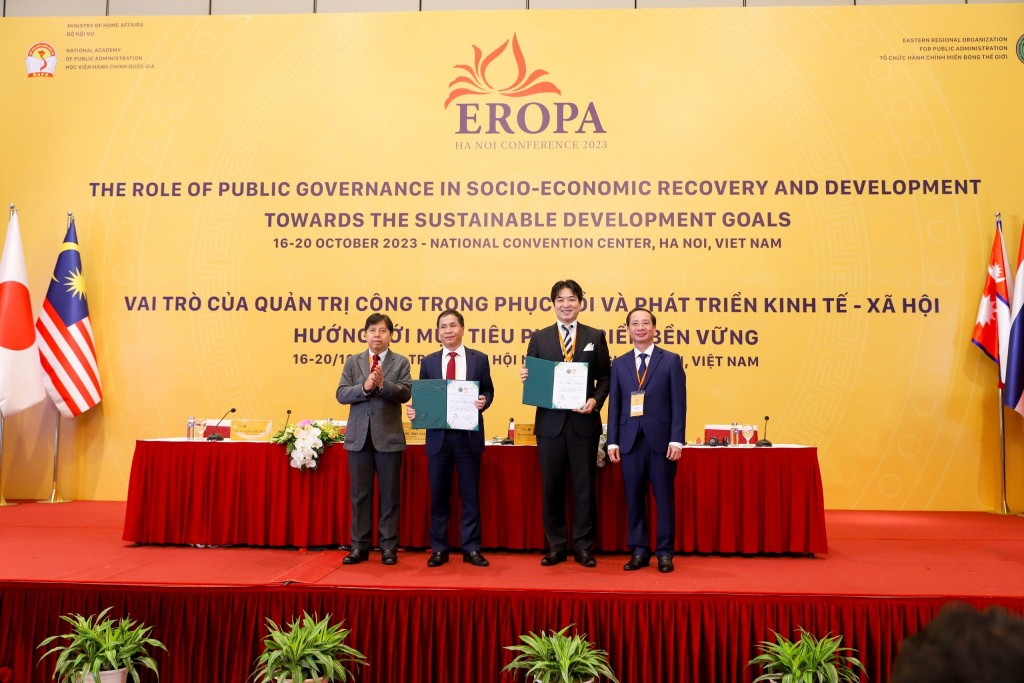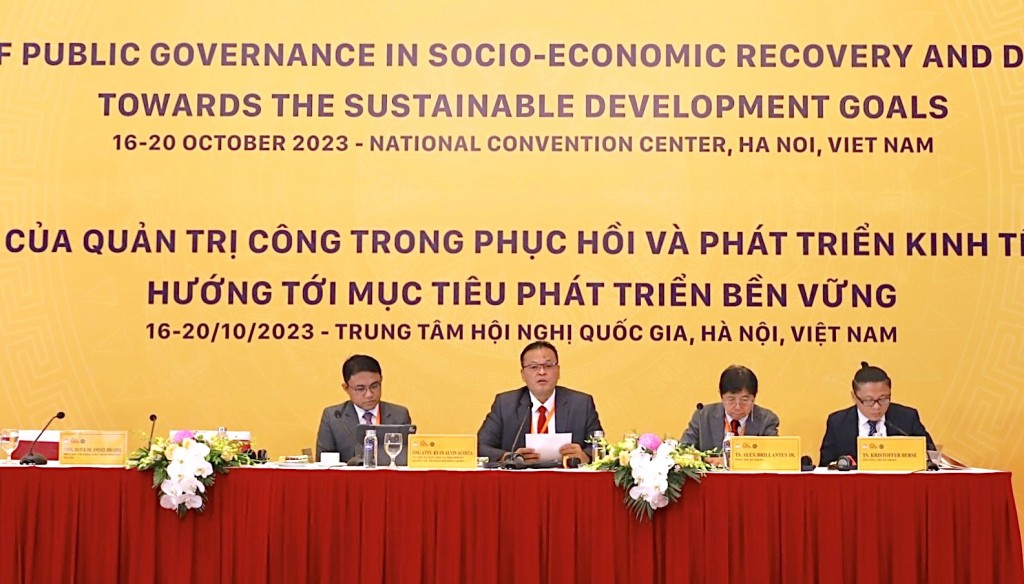On October 17, at the National Convention Center, Hanoi, within the framework of the 2023 EROPA Conference, the Conference Plenary I themed the 11th Asian Leadership Forum on “Public Governance for Sustainable Development Goals”. H.E.Assoc.Prof.Dr. Trieu Van Cuong, Vice Minister of Home Affairs of Viet Nam and Prof.Dr. Masao Kikuchi, Meiji University, Japan, chaired the session.
H.E.Assoc.Prof.Dr. Trieu Van Cuong, Vice Minister of Home Affairs, welcomed the delegates to the 2023 EROPA Conference and to the Conference Plenary I. He emphasized that the Forum is for policy leaders in the Asia-Pacific region with the aim of discussing important and urgent policy issues in public administration and governance today. Since the first Forum held during the 56th EROPA in Nepal, the Forum has discussed important topics in leadership and management, such as leadership in dealing with global crisis trends, regional and global cooperation leadership, and public administration leadership for sustainable development goals. EROPA also serves as a venue for leaders to discuss new and challenging matters and innovation methods towards effective and efficient public governance that reflects a new vision with the active participation of different actors in society to address common issues at all levels, from local to national and global. Assoc.Prof.Dr. Trieu Van Cuong believes that the 11th Asian Leadership Forum, with senior and experienced plenary speakers, will make profound contributions to effective public governance on the national and global scale – a decisive significance to sustainable development and prosperity of nations.
Chairing at the Conference, Prof.Dr. Masao Kikuchi proposed that scholars focus on exchanging views on the main topic of the Forum. He also set time constraints for the speakers. Following the presentations, there will be a question-and-answer session and discussions.
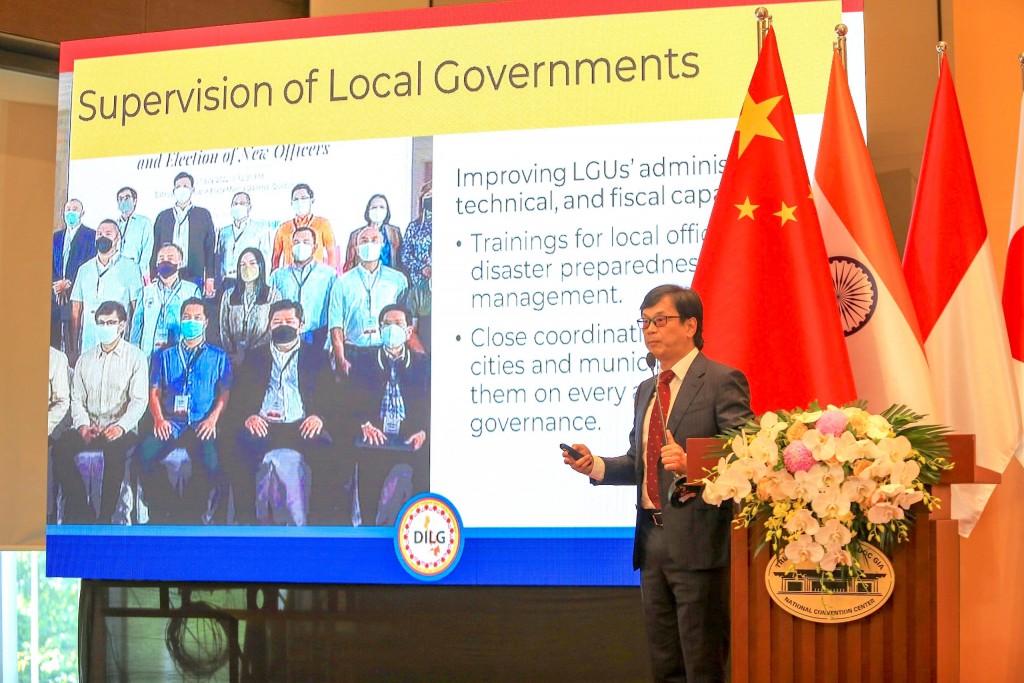
Plenary speaker Hon. Benjamin Abalos Jr., Minister of the Interior and Local Government of the Philippines, speaking at the Forum.
Reporting at the Forum, plenary speaker Hon. Benjamin Abalos Jr., Minister of the Interior and Local Government of the Philippines, emphasized that the Philippines’ sustainable development goal is to restructure the national development model, transforming the economy to be investment-driven, thereby achieving inclusive and sustainable economic growth. In addition, the organization of the local governments in the Philippines over the past 30 years aims to enforce policies and guidelines to institutionalize democracy at the local level and transfer authority, jurisdiction, and resources to local government units. This creates conditions for local governments to best meet the requirements of providing public services to the people.
His report also discussed the Philippine Government’s 10-point policy agenda to accelerate and sustain the country’s economic recovery after the Covid-19 pandemic. Accordingly, this includes strengthening health care capacity; accelerating and expanding the Covid-19 vaccination program; further opening up the economy and expanding public transportation capacity; resuming in-person learning programs; easing domestic travel restrictions and standardizing local government unit requirements; relaxing regulations for international travel; promoting digital transformation through legal provisions; providing urgent and flexible measures through the rule of law; shifting the focus of government decision-making and reporting to more useful and powerful indicators; and preparing for mid-term pandemic resilience.
With his rich and profound practical experiences as a leader and expertise and in-depth knowledge in public administration and public governance, Hon. Benjamin Abalos Jr. brought vivid experiences in leadership and management in a dynamic and innovative environment aimed at sustainable development goals.
Dr. Alikhan Baimenov, Chairman of the Astana Civil Service Hub, Republic of Kazakhstan, sent a video clip of his presentation to the Forum. Since September 2014, he has been serving as the Chairman of the Steering Committee of the Astana Civil Service Hub (ACSH), a multilateral platform for improving civil service and knowledge sharing consisting of 43 participating countries. According to Dr. Alikhan Baimenov, the current socio-economic situation in the Asia-Pacific region has a significant impact on the interests of every country worldwide. It is forecasted that the world will continue to experience complex, rapid and unpredictable changes in the near future. Therefore, understanding and researching the international and regional context is essential for formulating timely policies and strategies to ensure the interests of each country and its people. This also brings various requirements for the renewal of public administration, making it more accessible to the citizens, reducing bureaucratic elements within the government machinery, and simplifying and streamlining administrative procedures. Moreover, there is an emphasis on promoting the development of an effective e-government model, aiming towards building a digital government, digital economy, and digital society.
YBhg. Dr. Dato Anesee Ibrahim, Deputy Director General of the Malaysian Public Service Department, underscored the importance of good public governance in promoting integrity, transparency and gaining the trust of the people. Malaysia has maintained its determination to reform over many years and multiple government terms, regularly amending, supplementing, or replacing it with other better reforms. As a result, the continuous, ongoing effects of reform have consistently raised efficiency to a higher level. Malaysia’s best practice approach has shaped many of its reforms, significantly contributing to improvements in public administration effectiveness (e.g., the privatization initiative to apply market principles in public service provision inspired by the experience of the UK). In addition, the active public participation and effective coordination among agencies during the reform implementation process contribute to a responsible atmosphere in execution, promoting rapid and noticeable effectiveness in implementation.
Dr. Agus Pramusinto, Chairman of the Indonesian Civil Service Commission, sent a video clip of his presentation to the Conference. In the report, he shared about bureaucratic reform in Indonesia, especially the Government’s priority in promoting infrastructure development to drive economic growth towards sustainable development goals. Indonesia has innovated non-state budget funding from four resources: (1) Public-Private Partnerships (PPP) – regulating infrastructure development through both state and private funding; (2) Blended finance – finding an optimal funding program through a combination of many financial sources; (3) Sustainable Development Goals (SDG Indonesia one) – funding for sustainable development goals through various sources; (4) Value capture – a mechanism used by the government as additional economic value to be used as future funding sources.
Summarizing the Conference Plenary I, Assoc.Prof.Dr. Trieu Van Cuong extended his gratitude to the leaders and speakers who participated and shared their insights, making the Forum a productive, high-quality, and successful discussion session. He encouraged scholars to continue their discussions through platforms provided by the EROPA Secretariat and NAPA. He expressed confidence and hope that the valuable knowledge and best practices shared at the Asian Leadership Forum will serve as an opportunity for delegates to enhance their awareness and ability to address leadership challenges and promote socio-economic recovery and development, all in pursuit of sustainable development goals.
By the end of the Conference Plenary I, certificates of recognition were presented to those who chaired the discussion sessions. Dr. Alex Brillantes Jr., EROPA Secretary-General and Assoc.Prof.Dr. Nguyen Ba Chien, NAPA President, presented certificates of recognition to Assoc.Prof.Dr. Trieu Van Cuong, Vice Minister of Home Affairs and Prof.Dr. Masao Kikuchi, Meiji University of Japan, acknowledging their valuable contributions in their roles as Chair and Co-Chair of the 11th Asian Leadership Forum themed “Public Governance for Sustainable Development Goals”.
After the Conference Plenary I, the General Assembly I took place with the following content: (1) Election of the President and Vice President of the 29th General Assembly; (2) Presentation of Report of the Secretary-General of EROPA, Dr. Alex Brillantes Jr.; (3) Presentation of Report of the Deputy Secretary General for Research and Publications, Dr. Kristoffer Berse.
Prof.Dr. Adi Suryanto, Chairman of the Indonesian National Institute for Public Administration, was elected as the President of the 29th General Assembly; YBhg. Datuk Dr. Anesee Ibrahim, Deputy Director General of the Malaysian Public Service Department, was elected Vice President of the 29th General Assembly. Prof.Dr. Masao Kikuchi, Meiji University, Japan, was reappointed as Chair of the Future Plans and Programs Committee; Dr. Vincent Wong, Vice President of the Hong Kong Public Administration Association, was reappointed as Chair of the Resolutions Committee of the Executive Council.
At the General Assembly I led by Prof.Dr. Adi Suryanto, newly-elected President of the 29th General Assembly, heads of State member delegations presented welcome messages to the 2023 EROPA Conference.
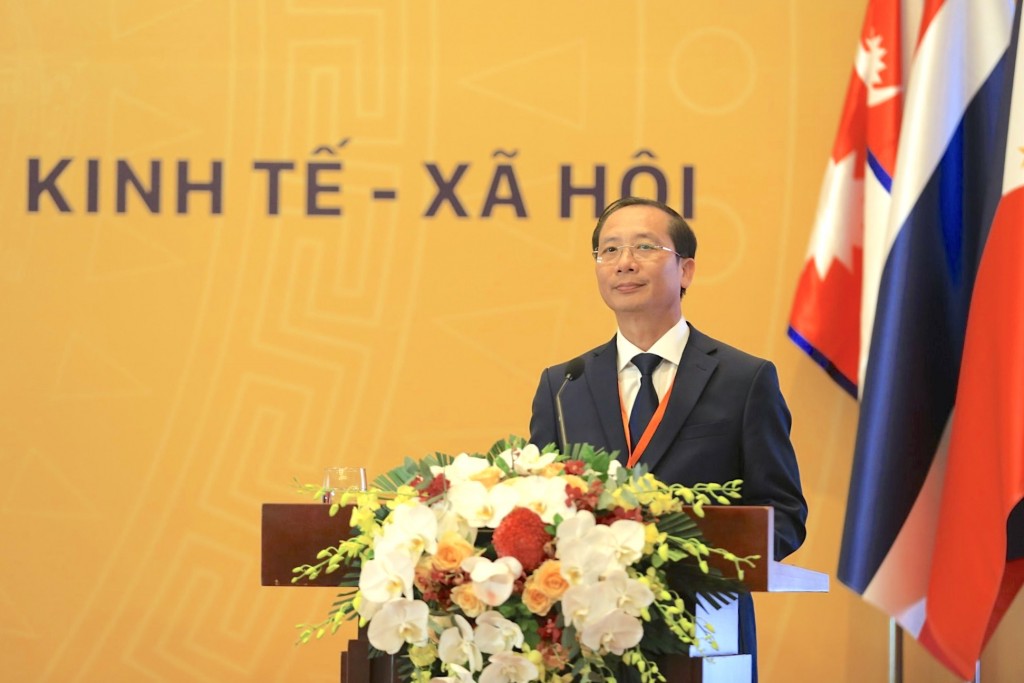
Assoc.Prof.Dr. Nguyen Ba Chien, NAPA President and Chair of the EROPA Executive Council for the 2024 – 2025 term, delivering his welcome message.
Representing the host country of the 2023 EROPA Conference, Assoc.Prof.Dr. Nguyen Ba Chien, NAPA President, extended the warmest welcome to all delegates and speakers attending the Conference. The 2023 EROPA Conference themed “The role of public governance in socio-economic recovery and development towards the sustainable development goals”, along with the sub-themes, reaffirms the spirit of close cooperation and unity among public administrators, organizations, and individuals within the EROPA network. This collective effort is directed towards the sustainable development goals of each country and the entire region. Assoc.Prof.Dr. Nguyen Ba Chien believed that the spirit of cooperation and unity is a solid foundation for EROPA practical actions striving to build a sustainable, peaceful, and prosperous world. This holds particular significance in the context of globalization, multi-polarization, and peaceful development, which are notably prominent in the Asia-Pacific region, making it one of the most dynamic and potential areas in the world.
Representatives from China, Indonesia, Japan, Malaysia, the Philippines, South Korea, and Thailand all sent their welcome messages to the 2023 EROPA Conference. They expressed their hopes for the Conference’s success, with common goals of sustainable socio-economic development alongside progress, social equity, and environmental protection because their mutual concern is peace, security, and prosperity.



